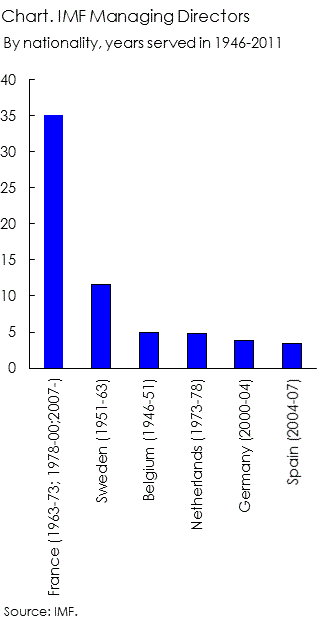Next IMF Managing Director
19 May 2011
Ousmène Jacques Mandeng, Ashmore Investment Management
The IMF needs a new boss. Dominique Strauss-Kahn resigned as IMF Managing Director amid his pending indictment on criminal charges. Any new MD needs to be apolitical, provide credible leadership to ensure the IMF remains influential yet be seen as impartial, deal with governance and reputational concerns of the institution and be visionary and effective in enforcing its man- date especially also in a post-crisis environment. The IMF has been de- signed as and its strength rests on being a technocratic institution and politics should not unnecessarily interfere with its mandate. Meanwhile, the absence of an MD and transition to a new MD should not impair the functioning of the IMF nor its capacity to deal effectively with current issues given its institutional strength. The selection process therefore should not need to be unduly rushed.
The IMF has probably two options now: 1) to find a replacement to serve out Mr Strauss-Kahn’s residual term (through September 2012); or 2) to launch a fresh candidacy to serve a full 5-year term. In the event an interim candidate is chosen, possible candidates will most certainly be from Europe, most likely from France. The MD has traditionally come from a Western European country (Frenchmen served 35 out of the 64 operational years of the IMF) (Chart). For a fresh candidate, the IMF will be under great pressure to open the selection process irrespective of nationality following repeated criticism that the selection is too narrow and too guided by geography. In 2006, the IMF MD’s report to the International Monetary and Financial Committee (de facto advisory body of the IMF) on IMF Quota and Voice Reform (reform to give more say to emerging markets) cited that “there is considerable agreement on the importance of ensuring that procedures for the selection of the Managing Director are open and transparent.”
The selection process itself is potentially a minefield. There can be several rounds of voting and straw polls to determine candidates’ strengths. In 2000, when Michel Camdessus resigned and Germany put forward its candidate Caio Koch-Weser, there was considerable uproar among member countries amid concerns about the qualities of the candidate (his main drawback was probably that he was previously at the World Bank) and Germany had to withdraw him and propose Horst Köhler (Germany). In 2004, when Rodrigo de Rato (Spain) was elected there was a field of 5 candidates (including non- Western Europeans), 3 of which withdrew promptly. In 2007, when Mr Strauss-Kahn was elected (he was nominated by Germany on behalf of the European Union), there was also Josef Tosovsky (Czech Republic) put for- ward by Russia. The Europeans have the great advantage that they have institutional mechanisms to agree on a candidate upfront. The emerging markets may find it more difficult to identify a common candidate and then lobby to ensure that he or she obtains sufficient support from the U.S. The remains for all practical purposes the MD selection dealmaker. Any new MD will have to address a number of complex issues:
Enforcement of mandate: The IMF has seen a good crisis. It was plugged back into world economic affairs after seeing its influence fade during the 2000s. Yet, the IMF’s mandate rests on surveillance and as such continuous involvement with its country members’ affairs (IMF Articles of Agreement, Article IV, sections 3(a) and 3(b)): “The Fund shall oversee the international monetary system in order to ensure its effective operation, and shall oversee the compliance of each member [country] with its obligations […]. In order to fulfill its functions […], the Fund shall exercise firm surveillance over the exchange rate policies of members […].” Any new MD will need to make sure that the IMF has the ear of its members, in particular its large ones, not only in times of distress but in particular in tranquil times.
Governance: The IMF’s governance has come under increased scrutiny. The institution has been perceived increasingly as being dominated by its advanced economies’ members lending to its emerging markets members. Historically, the IMF had been set up to serve de facto advanced economies and borrowing occurred at collegial terms to like minded countries. The advanced economies/emerging markets divide created frictions between perceived natural creditors and perceived natural borrowers. The IMF launched a reform of quotas and voice in 2006 to basically give more voting power to emerging markets. Voting power has shifted (and there is agreement for it to shift more) but cannot produce further large changes nor is it in itself likely to do much (Table). Attitudes have changed, in particular with the crisis in the Euro- zone. However, any new MD will need to address sustained imbalances within the institution between advanced economies and emerging markets (6 out of 13 of the non-administrative department heads are Western Europeans), significantly beyond voting power, to strengthen the legitimacy of the institution.
